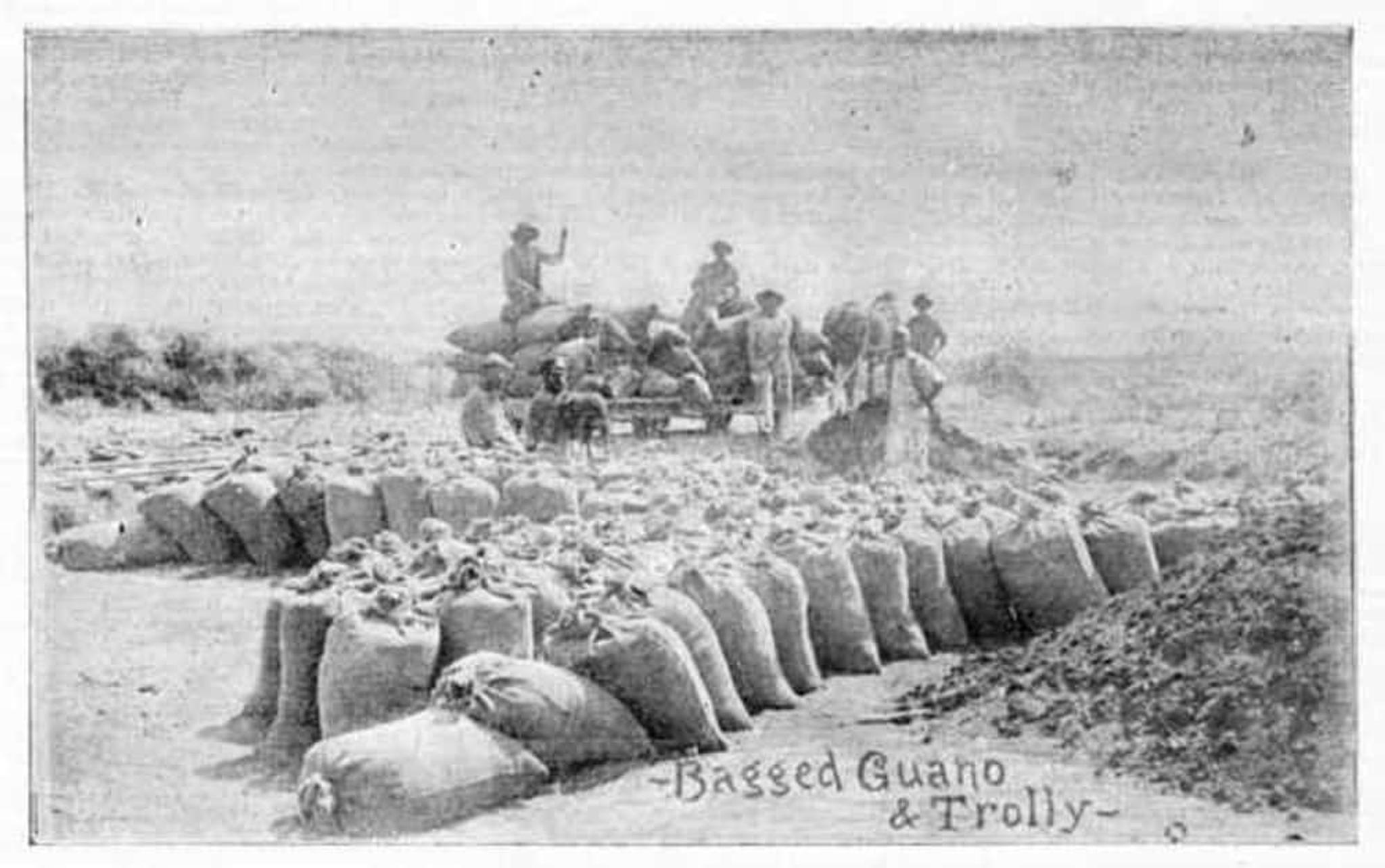James Picken
Vessel Name: Retriever
James Picken
Retriever|
Died aboard; body recovered
20 March 1877

Bagged guano ready for loading
James Picken was the son of Samuel Picken and Mary Stuart Blair. He was one of six children born on 22 August 1849 in Rothesay, Buteshire in Scotland. In Western Australia Samuel continued to work as a marine surveyor. He established the partnership of Poole, Picken and Company, trading and chartering ocean-going vessels. Samuel asked James to join the business.
In November 1873, Samuel died. James was the sole beneficiary of his will and at the age of 28 years he was suddenly elevated to partner in the business.
In 1876 James was granted the lease for the guano on the Lacepedes Islands, which resulted in increased trade and a need for more trading ships and labour.
The Lacepedes Islands are four sand cays on top of coral reef. The largest is West Island, 107 hectares in size. The next is 54-hectare Middle Island. The islands lie north of Broome, approximately 30 kms off the Dampier Peninsula.
Working the Lacepedes Islands proved challenging. It seems Poole, Picken & Co. were authorised by the Colonial Government, but the Victorian Consul erroneously granted access to foreign ships which caused confusion and animosity between captains who thought they had a right to the guano from the islands. There were arguments about whose turn it was to load bags of guano. Loading could take a week, depending on the size of the vessel. Meanwhile other vessels had to wait.
James sent a representative of the company, Geddes, to the islands with a Police Constable, three boatmen and a Chinese cook. He was directed to bring order to guano removal and refuse guano to ships without the necessary authority to load their ships. Not long after his arrival Geddes called upon the Resident Magistrate in Roebourne, who issued summons to the French and American ship masters who removed guano from the islands. Most masters left the Lacepedes unladen and did not return.
James chartered and purchased large ships to take guano to the south of WA for domestic markets or overseas. He chartered the Hadda, a 334-ton wooden barque, a German built vessel whose owner lived in New South Wales. James also contracted the Aboyne, a 455 ton three-masted barque. She was commanded by Captain George Swan who sailed with his wife Mary and their two young daughters.
James also had the barque Retriever, the Prince Arthur, and the three-masted City of Hobart. He bought a lighter to help load them, Lighter No. 3.
In March 1877 a cyclone struck the northwest, violently destroying pearling and guano vessels in its path. The Aboyne was lost (that story is among the guano stories).
The Hadda was making her first voyage laden with guano. She put off from the islands ahead of the cyclone. Unfortunately, in a navigation error she struck reef at the Abrolhos Islands and sank.
James had decided to go to the Lacepedes himself. Commissioner Richard Wynne and Acting Colonial Secretary accompanied him. They took a Police Constable, three boatmen and a Chinese cook. Richard Wynne was tasked with “control of systematic removal of guano”. Richard acted as harbour master, customs officer, Justice of the Peace and Postmaster.
James’ party left Melbourne aboard the Retriever. They arrived in the northwest just after the cyclone had passed. When they were almost at the islands James had an epileptic seizure. He died aboard the ship. His death was sudden and unexpected on 20 March 1877.On the islands a deal coffin was made, and James was buried alongside the dead from the cyclone. It was understood his family would want to move him to Victoria as soon as a ship was able to take him.
Captain Walcott, Justice of the Peace, conducted an inquiry into the circumstances of James’ death. His report stated James had multiple epileptic seizures and had died during the final seizure.
In November James’ remains were disinterred and carried to Victoria. He was buried in the family plot in the Williamstown cemetery on 12 December 1877.
James had negotiated the lease of the Lacepedes Islands, and he paid 10 shillings per ton in royalties to the government coffers. James’ short career played a significant role in establishing the guano industry in WA, legal reforms to protect crown land from unauthorised exploitation and contributing to the economic wealth of the state.
James had not married and had no children to leave the business to. Poole, Picken & Company’s fortunes declined after James’ death. Several of the firm’s vessels were lost in the northwest. The struggle to enforce the legal rights were expensive and required consistency. Records indicate that the company ceased its business.
